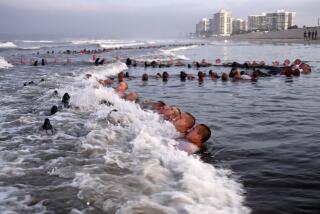Details of Top Admiral’s Suicide Note Disclosed
- Share via
WASHINGTON — In a note written before his suicide last May, Adm. Jeremy M. Boorda, then the Navy’s top officer, indicated that he was deeply concerned about recent criticism of the service and “couldn’t bear to bring dishonor” to sailors over questions about whether he had improperly worn decorations given to veterans of combat.
The suicide note, published, for the first time, in the December issue of Washingtonian magazine, is consistent with the official description of the contents provided by the Navy immediately after the 57-year-old chief of naval operations took his life. It suggests that Boorda felt he was under enormous pressure in addition to the questions over the combat medals.
“To my sailors,” he wrote, “I couldn’t bear to bring dishonor to you. . . . For those who want to tear our Navy down, I guess I’ve given them plenty to write about for a while. But I will soon be forgotten. You, our great Navy people, will live on. I am proud of you. I am proud to have led you if only for a short time. I wish I had done it better.”
The Navy had declined to release the text of the note. It is included as part of a Washingtonian article by Nick Kotz, a freelance writer. The article noted that the Navy faced intense scrutiny during Boorda’s two years at the top, including scandals involving sexual harassment and wrongdoing at the U.S. Naval Academy.
Some elements of the Navy, the article said, thought that Boorda had tried too hard to appease politicians in his handling of the fallout over the 1991 Tailhook sexual-harassment scandal. Although Tailhook occurred before Boorda moved into the top spot, he inherited criticism over the Navy’s investigation and discipline of those involved.
Boorda was the only Navy man who had risen from the enlisted ranks to the service’s highest post. Although he was a popular figure within the rank-and-file, the Washingtonian article said he was considering resigning two years early because of the mounting criticism.
Boorda shot himself in the chest with a .38-caliber revolver May 15, shortly before he was to meet with a Newsweek reporter who was questioning the admiral’s right to wear two “Combat V” pins.
The dispute stemmed from his role as an officer serving on a ship off the coast of Vietnam in the 1960s. Boorda removed the medals after questions first arose about his right to wear them, although military officials said after his death that the issue was far from clear, given ambiguities in Navy regulations at the time and the language of citations Boorda received for his service off Vietnam.
Newsweek began asking questions about the medals about a year after Boorda took them off.
“I am about to be accused of wearing combat devices on two ribbons I earned during sea tours in Viet Nam,” Boorda wrote in his note. “It turns out I didn’t really rate them. When I found out I was wrong I immediately took them off, but it was really too late. I don’t expect any reporters to believe I could make an honest mistake, and you may or may not believe it yourselves. That is up to you and isn’t all that important now anyway.
“I’ve made it not matter in the big scheme of things because I love our Navy so much, and you who are the heart and soul of our Navy, that I couldn’t bear to bring dishonor to you. . . . “
Elsewhere, the note said: “What I am about to do is not very smart, but it is right for me. You see, I have asked you to do the right thing, to care for and take care of each other and to stand up for what is good and correct. All of these things require honor, courage and commitment. . . . Our core values.”
“If you care to do so, you can do something for me,” Boorda wrote. “That is take care of each other. Be honorable. Do what is right. Forgive when it makes sense, punish when you must, but always work to make the latter unnecessary by working to help people be all they really can and should be.”
More to Read
Sign up for Essential California
The most important California stories and recommendations in your inbox every morning.
You may occasionally receive promotional content from the Los Angeles Times.













